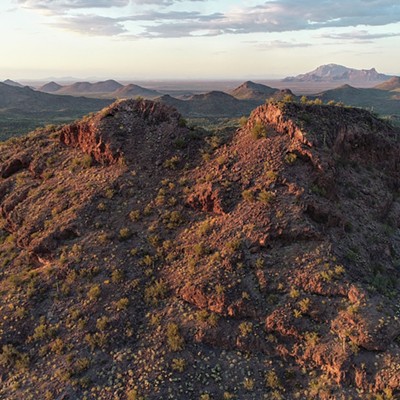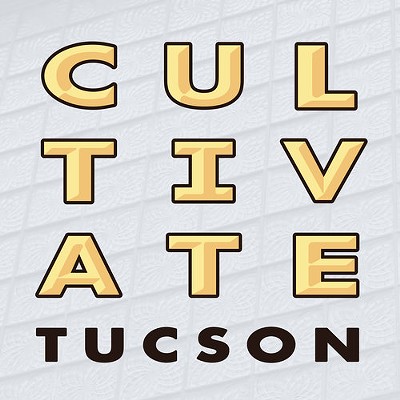Celebrants sauntered across twin patches of moistened lawn at Armory Park and the Tucson Children's Museum, testing their environmental wits at game booths, or boning-up on recycled processes and desert critters. Nearby, an overheated cop orchestrated a bumper-to-bumper habitat at the intersection of Sixth Avenue and Broadway Boulevard, his arms swinging like authoritative saguaros in the piercing desert sun.
This event even came with its own cuddly cadre of Earth-friendly sponsors, from Tucson Electric Power and Apache Nitrogen Products to multinational aluminum producer Alcoa, perhaps best known for its toxic Texas smelter near Austin.
True, protesters have marred these otherwise innocuous assemblages in the past. But Earth Day 2005 was quieted a bit by the departure of long-time sponsor Raytheon Missile Systems. Protests against the arms maker had only become angrier as Operation Iraq Freedom got underway, says Earth Day co-chair Christina Bickelmann. "So we just kind of agreed it was becoming negative for us and for Raytheon."
Still, the remaining underwriters reveal how far Earth Day has come--or how far it has traveled from its roots. Begun in San Francisco in 1969, the gathering was meant to raise awareness of nature and ecological issues. It was a huge hit and went national a year later when an estimated 20 million people attended workshops, street demonstrations and teach-ins.
Not surprisingly, corporations soon grew intrigued with this huge audience; today, their logos adorn Earth Day events from coast to coast. Not surprisingly, Tucson's festival jumped aboard the business bandwagon. "We originally worked to include local environmental groups," says Bickelmann. "But they didn't have any money. It costs a lot to put this event on."
Others call the selling of Earth Day a national travesty. Among them is Geoffrey Johnson, program coordinator for The Green Life environmental watchdog group, based in Boston. Not long ago, Johnson vented in a fierce New York Times editorial. "Welcome to Earth Day ..." he wrote, "brought to you by petroleum powers, big-box developers, old-growth loggers and chemically dependent coffee companies trying to paint their public image green."
Contacted by phone, Johnson says many companies with rotten environmental records spruce up their public images by supporting innocuous environmental events. "They use Earth Day as a PR tool. Locally, they might be playing host to the same citizens they are poisoning year-round. It can take a couple of forms, from just a general public relations effort to attempts to cultivate a reputation of environmental responsibility."
Lord knows some Tucson Earth Day sponsors could use a little help in that regard. Take Tucson Electric Power: While TEP has been praised for pushing solar power through its Green Watts and SunShare programs, the company also battles environmental groups on a regular basis. They've tangled over the utility's plans to build a new coal-burning plant in Northern Arizona, with critics charging that TEP will foul Arizona's air just to generate power for out-of-state customers. Closer to home, residents and environmentalists have fought Tucson Electric's proposal to run massive power lines through sensitive areas of the Coronado National Forest down into Mexico.
Company spokesman Joe Salkowski refused to comment on TEP's environmental skirmishes or its participation in the Earth Day event. However, one company source says that while the utility has been involved in Earth Day for about three years, "this year, we're not participating in the Earth Day parade because of the protesters."
Another eyebrow-raising participant is Apache Nitrogen Products. Nestled among desert hills between Benson and St. David, Apache is a federal Superfund site; surrounding groundwater and soils contain a snarky brew of contaminants ranging from beryllium and arsenic to lead. Apache recently paid a $40,000 federal fine for violations of the Clean Air Act and EPA pollution standards. It's also listed among 111 chemical factories in the United States where an attack or accident could affect more than a million people.
Ongoing dangers posed by any chemical plant aren't disputed by Pamela Beilke, Apache's director of technical services. However, she says the company's environmental transgressions are history. "We've been in operation since the 1920s and--like many that have been in operation for a long time--our past disposal practices affected the shallow groundwater in the area. We've been actively involved in remediating that for a period of time now."
As for the Clean Air settlement, "that was a finding of violation that we received from the EPA a number of years ago, related to emissions from our nitric acid plants during start-up of those plants."
Beilke doesn't think Apache's environmental record "disqualifies us from sponsoring Earth Day." To highlight this turnaround, she cites a 2002 Governor's Pride in Arizona Award received by the company, after it developed a process to greatly reduce those start-up emissions. "Just because historical practices have resulted in contamination doesn't mean the company is not committed to the environment," Beilke says.
Still, the motives of Apache and TEP are murky, says Geoffrey Johnson. "A company such as Apache Nitrogen could be funding an Earth Day event in order to prevent that Earth Day event from turning into a protest for, say, clean water. Or the local power plant might fund an Earth Day event to prevent a protest for clean air."
But such "greenwashing" can backfire, says Dr. Merrie Brucks, an Eller Professor of Marketing and Psychology at the UA. "It is a risky strategy, because it might remind consumers of the company's past environmental problems," she writes in an e-mail to the Tucson Weekly. "If the environmental problems are currently in the news, this strategy is very likely to backfire by calling attention to the problems."
At their extreme, those practices could constitute the "possible deception of consumers, employees, potential employees, stockholders, and/or the community at large," Brucks writes. "If this deception is intentional, then the sponsorship is unethical by almost any standard."
Want a gathering that's for real? Visit the Tucson Community Earth Day Celebration from 10 a.m. to 7 p.m. on April 23 in Himmel Park. The difference will be immediate--and refreshing.
"We're not accepting sponsorship from corporate polluters," says event organizer Meredith Hartwell. "Instead, we're asking for financial support from all of the participants, so it is monetarily supported by the people who are actually there. And we're reaching out to a diverse cross-section of local community organizations doing good work, not only for the environment, but also those that are helping people, such as the ACLU and the Tucson Peace Center."
This Tucson Community Earth Day Celebration has a long list of truly local sponsors, from Ali Baba Restaurant and Friends of Saguaro National Park to the Center for Biodiversity. Homegrown musicians will also be on hand, from Tony Redhouse to Scotty Johnson. The gig will likewise feature political luminaries such as Congressman Raul Grijalva and state Sen. Gabrielle Giffords.












